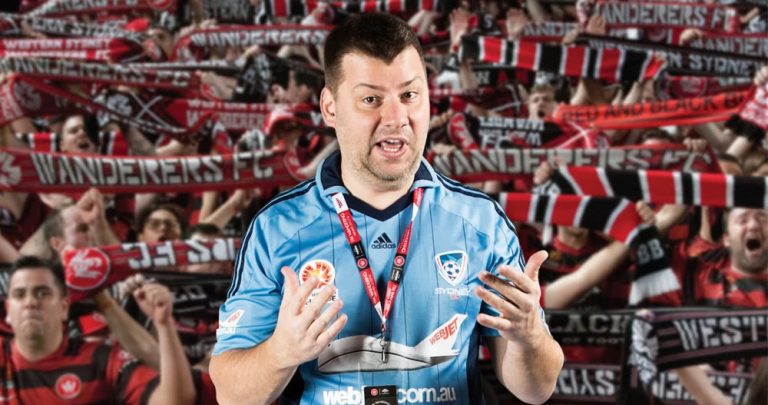Given the title of his new play Smurf In Wanderland, one could be forgiven for thinking David Williams has been bingeing too hard on Saturday morning cartoons. After all, smurfs are those little blue folk dressed in white, right? Apparently not.
“A ‘smurf’ is a nickname for a Sydney FC supporter – it’s a [reference to] the sky blue colours,” Williams explains. “‘Wanderland’ is what Parramatta Stadium is referred to during Western Sydney Wanderers home games. I’ve been a Sydney FC member for almost a decade now, and I was born in Parramatta. The show Smurf In Wanderland uses football to take a journey across the suburbs of Sydney to consider how the city is connected and divided.”
Williams’ new theatrical outing isn’t just some exercise in football terminology, or merely a confusing collection of buzzwords designed only for those who know and love the sport. “I think that football fans will understand a few more of the references in the show, but this is absolutely a show that will be accessible and enjoyable to audiences who have only minimal engagement with sport,” Williams says.
The theatre rarely turns to sport for subject matter. It’s a shame, because the stories in this domain are so rich.
It helps that Smurf In Wanderland has also been designed as a kind of exploration of Sydney itself. It’s a humorous, well-researched jaunt through concepts as far-reaching and weighty as personal identity and tribal belonging – just with a good dose of footy thrown in.
“The show is very concerned with what it means to ‘belong’ to a football club, and how people build identities for themselves around this desire to belong,” Williams says. “And this is a show about Sydney as much as it is a show about football, so there are a great many attempts to understand how Sydney ‘works’, and to untangle my own relationship to the city.”
For some, theatre, sport and considered examinations of the city we live in may sound like three of the most ill-fitting bedfellows ever assembled. Yet for Williams, there is no distinction between what is commonly considered ‘high’ and ‘low’ art, and writing Smurf In Wanderland allowed him to blur the lines between a whole host of varied creative forms. “I’ve been a member of a football club for nearly ten years, and working professionally in theatre for over 20 years. The two have always been entangled in complex ways for me – and lots of theatre people I know are rabid sports fans.”
That’s not to suggest Williams isn’t aware that theatre is often revered as a more ‘cultured’ brand of entertainment than sport, and he understands all too well the kind of folks who might turn their nose up at the idea of an uncouth rabble of sports fans descending upon the sanctity of the theatrical space.
“It’s true that the theatre rarely turns to sport for subject matter,” Williams admits. “It’s a shame, because the stories in this domain are so rich, and the passions that drive fans are fantastic territory for storytelling. I hope that this show encourages more work in this area.”
Grand ambitions concerning how the show might change the shape of Sydney’s theatre scene aside, Williams also has smaller, more practical aims. More than anything else, he wants his audience to walk away enlightened and entertained – thinking as well as feeling. “I want the audience to think about how they belong to something larger than themselves. To consider the ways in which their lives are shaped geographically, and experience the joys of shouting out football chants with strangers. And, of course, just to have fun.” ■
[Smurf In Wanderland photo by Eric Berry]
Smurf In Wanderland runs Tuesday May 2 – Saturday May 13 at SBW Stables Theatre; and also playing at Riverside Theatres, Thursday April 20 – Saturday April 29.


































